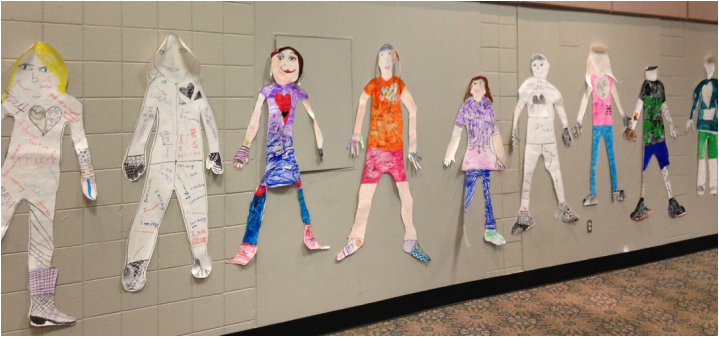Many children who start kindergarten too far after they are academically ready for the kindergarten standards find themselves in classes where the work comes easy and they are able to breeze through it without learning to struggle. They start out thinking school should be easy and they balk at challenges when things get tough. Research has shown that kids who are used to thinking of themselves as "smart" may believe that working hard means they are not as smart, so when they encounter situations where they have to work hard they shy away from the challenge. These students may begin to exhibit delay tactics when they are expected to achieve on more difficult tasks. Students who are able to easily grasp the concepts and do most of the classwork without much stress also tend to acquire behaviors such as disrupting others and being silly during the instruction or even just tuning it out and daydreaming- all habits that follow them for years and impact their ability to absorb information and function well in the school setting.
Gifted children also often come to school (at any age) with social emotional challenges due to their giftedness, that teachers should be aware of and work with them to accommodate their gifted nature and to develop better life coping skills. These students may struggle with these same gifted traits their entire lives. (Some gifted children may also be twice exceptional, what we type as "2e", which may make it particularly hard to determine whether a child is struggling with social or emotional skills or merely expressing frustration at their conflicting exceptionalities, which is another conversation altogether, albeit a much related one.)
It is important then that if local school districts will have the power of evaluating potential early entrance kindergartners, that they also recognize social emotional traits of the gifted and not use them to turn these students away whose traits may appear to be caused by immaturity to the untrained district official.
Therefore, I have developed this list of characteristics from gifted research and articles, that districts can use to help them during their screening process in order to recognize social emotional challenges that are inherent in many gifted children. This list should help evaluators recognize the possibility of a particular child needing further gifted services, and hopefully lead them to referring the child for gifted evaluation by a psychologist.
A child who is academically ready for kindergarten, but who has social emotional challenges may be more in need of kindergarten services than many other students who are not academically ready even when they meet the required age for regular entrance.
Gifted is considered a special education classification in Florida and gifted children, even those who remain formally unidentified may exhibit behaviors and quirks that require accommodation at any age. Waiting a year for them to mature may actually be detrimental to their social-emotional growth and achievement.
Keeping this in mind, districts are encouraged to admit potentially gifted 4 year olds who show a need for academic advancement (early entrance to formal education,) and whose social emotional traits are within a realm where they can benefit from being in class and will not be excessively disruptive to other students if they are given appropriate accommodations (as any other special education student.)
Here is a list of characteristics an evaluator should look for while using any formal evaluation tool the district requires while screening a child for early entrance to kindergarten in your school district:
Does the child exhibit any of the following traits?
-the child prefers to socialize with the teacher rather than students in their age range
-the child has a high level of knowledge about an issue or thing that he or she is personally interested in
-the child has a high level of vocabulary
-the child does not seem to know how to effectively engage other students in socialization activities such as working with others, sharing information, joking around, etc.
-the child is uninterested in what students their age are doing, but may be more interested in helping younger children or engaging with much older people.
-the child is much more interested in the big picture or asks many "why" and "how" questions about the way things work or fit into the world in a larger scale.
-the child seems knowledgeable about things happening in the world outside school or is very interested in social or justice issues if they are told about them.
-the child has a lot of energy and/or can be easily distracted by something that is more interesting than the lesson in class.
-the child is highly sensitive to sensory stimulation- such as smells, bright lights, loud noises, itchy clothing, bumps in their socks, etc.
-the child has a high level sense of humor.
-the child seems to enjoy arguing or finding exceptions to rules or statements.
-the child seems to constantly be challenging authority or boundaries.
-the child seems to not have common sense when it comes to "street smarts" (paying attention to safety issues or social issues,) but seems highly intelligent or attentive in areas of personal interest (asynchronous development).
-the child shows perfectionist traits.
-the child has extreme highs and lows and seems emotionally intense (Seeming to over react to emotional stimulation.)
-the child seems anxious about things even more than other children his or her age in similar situations, such as worrying about being safe in a plane if they are traveling soon, or worrying about the safety of a parent when they aren't together, or worrying about their own performance, etc.
If a child exhibits these types of behaviors they may be gifted traits and not maturity issues. It is important that the child be screened further for a need for gifted support services, and the earlier they are given access to support, the better.
Gifted students should not be screened out of academic acceleration due to gifted traits that they may never "grow out of."
It is also important that cultural traits and any impacts of low socio-economic conditions be weighed in the decision as to kindergarten readiness so that children have equitable access to early entrance regardless of the advantages or lack of advantages they have had to extra-curricular activities, the English language, and other things that may make a child appear more or less "ready" for kindergarten. Gifted children are represented in every race, culture, and economic range and no child should not be held back by stereotypes or misunderstandings.
Thank you to all of you who understand the need to make sure all students access the services they need to help them grow and thrive in our school systems. And for helping all at-risk students achieve to their best abilities. Together we can prevent students from gaining habits that will harm them for many years to come and help more student avoid falling through the cracks. Early identification and support is the key and you are on the front line.




 RSS Feed
RSS Feed
